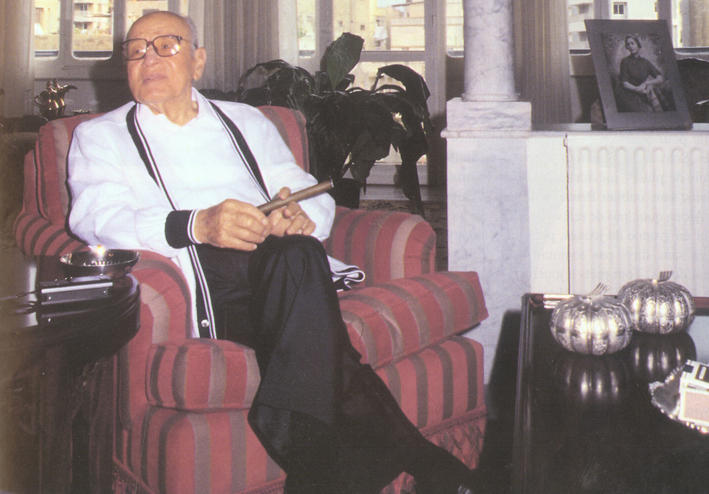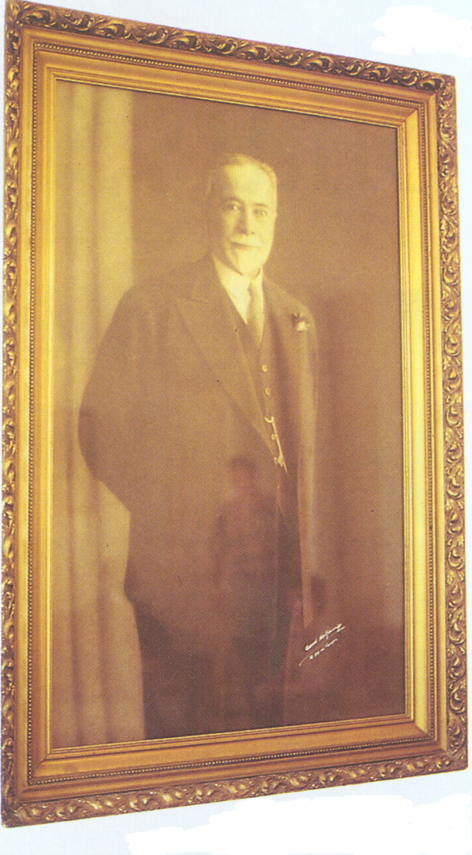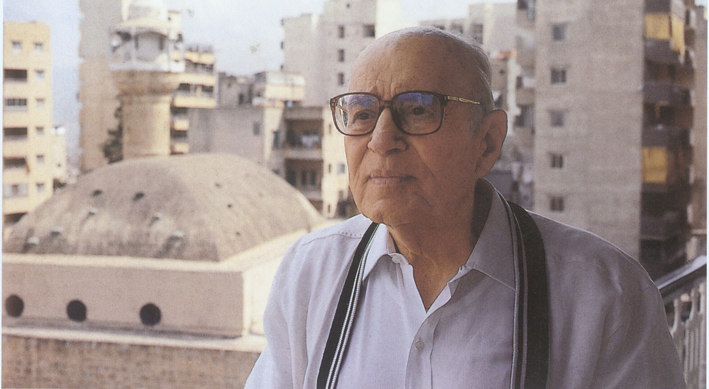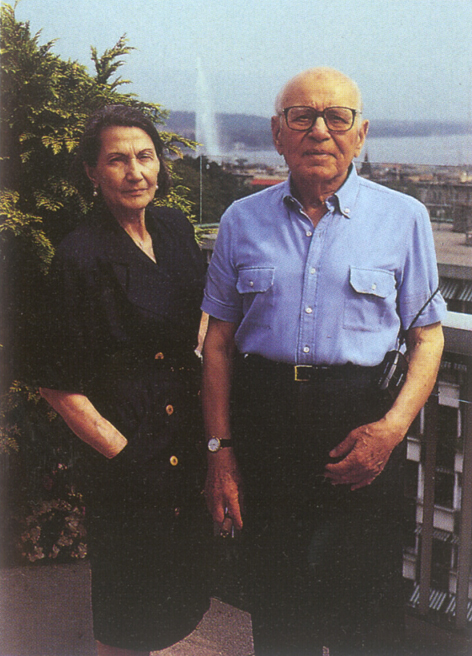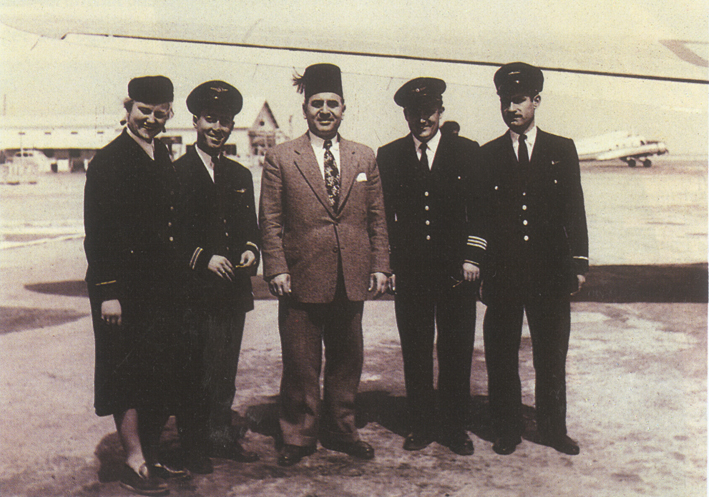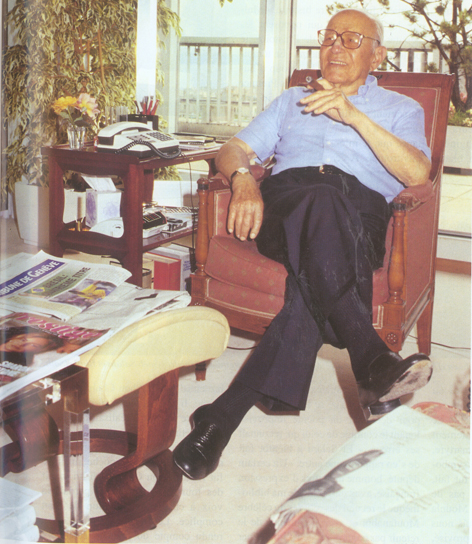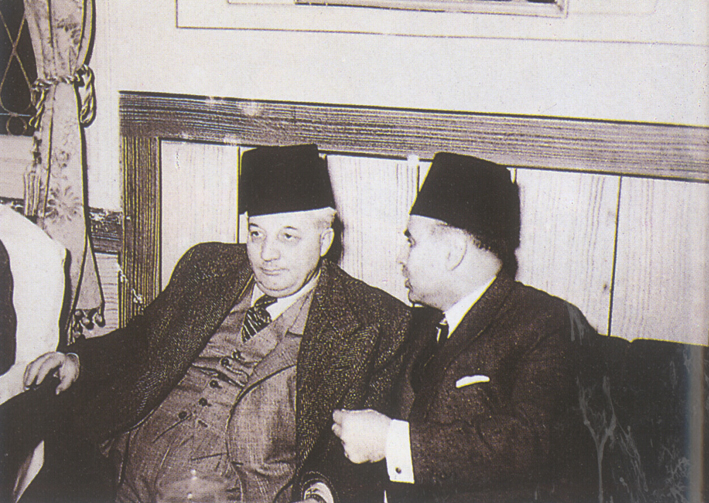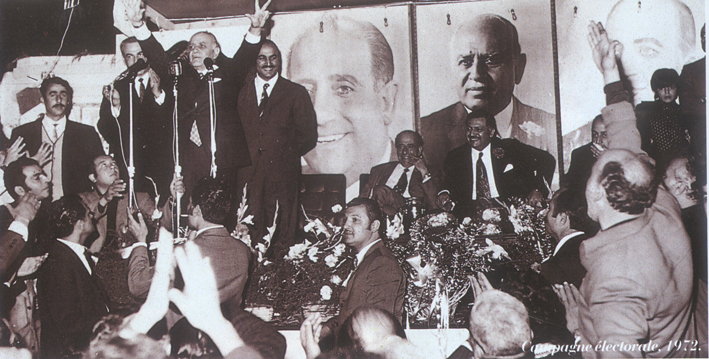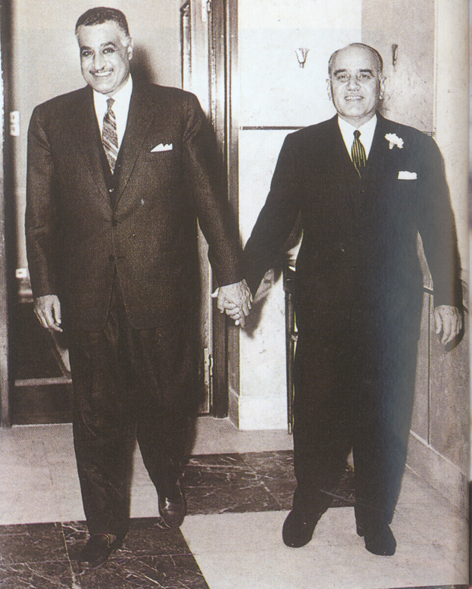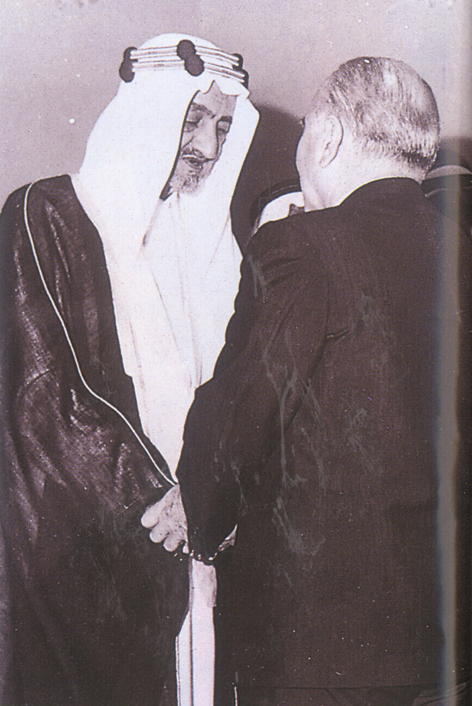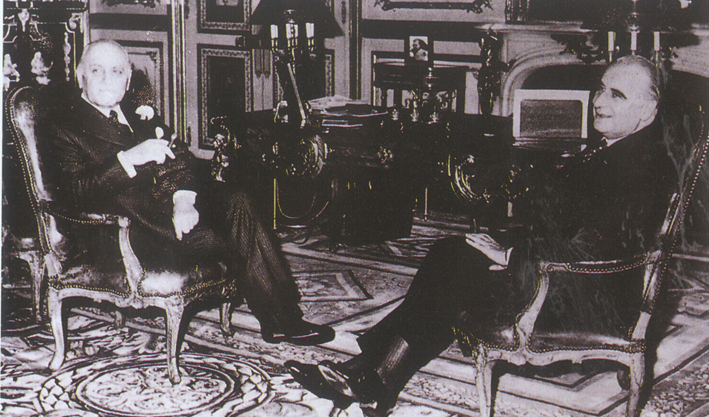Prestige issue 18, November 1994
Keystone of independence, since its beginning in 1946, he remains inseparable from the Lebanese political scene. His infallible memory guides us into unexplored windings deep in history.
© Prestige / Bassam Lahoud
In the Moussaytbeh reception.
First meeting. Geneva. Malagnou road. A cedar indicates that Lebanon is perhaps not so far away. Saeb Salam, punctual, welcomes us. Without his legendary carnation but with his usual look. Alert, relaxed, full of verve. Surrounded by his family for which he dedicates an unlimited attachment, this serene man; through the curls of his eternal cigar, unveils hundred and fifty years of politics.
Some weeks later. Beirut, Moussaytbeh neighborhood. Salam, lucid leader with quiet power, narrates with admirable simplicity the story of a family that accompanies for nearly two centuries the story of the nation. Although the politics has not always been a very pleasant occupation, Saeb Salam, prodigious storyteller, succeeds, with unparalleled ease, to make us live the dramatic situations in Lebanon since the Turkish occupation and the French Mandate, passing by the strong times of Independence until convolutions of contemporary politics. Of Saeb Bek as a child, willful and rebellious, following the route of his charismatic father, to Salam, the uncompromising MP, Minister and Chairman of the Council, he brushes for us singular portraits with a vigorous brush with good shots of anecdotes, that stand out the subtlety of a character so close to the myth.
Beirut beginning of the century. Children play in a shipyard. Established near Burj Moussaytbeh, at a respectable distance from the sea, away from the flamethrowers of Greek pirates, it is there that Saeb Bek meets his neighborhood friends. But he is above all the companion of his father, Abu Ali. With him, he takes the train to Damascus. People, often strangers, entrust their parcels to them for handing in the Syrian capital. Beirut, that counted in the XIXth century five thousand inhabitants, is thriving today. As for the Wilaya, it stretches from Latakia to Khan in Jerusalem. The tram draws the border of the capital. And in dikhenji, smoking rooms, in Furn el Chebback, young Saeb Bek sees abadays taunt the Turks who could not stop them: they were out of Lebanon’s borders! Each district had its customs, its society, its imposing zaim with the outfit indicating his status: seroual, caftan, embroidered waistcoat, fez. He runs the cane in hand, usually on horseback without which his image would be incomplete.
© Prestige / Bassam Lahoud
Portrait of Abu Ali, father of Saeb Salam, a supporter of modernism, posing in his city attire.
FAMILY PORTRAIT. “My grandfather was a merchant like his father before him. And politics rubbed our lives, it interfered in it for over 150 years. Abu Ali, a supporter of independence, chaired the first Arab Conference in Paris. Friend of Faisal, king of Syria, he was part of the delegation of the Coast, which in 1920 had gone to Damascus to swear allegiance to the ruler and try to introduce into the Doustour a clause recognizing the right of Lebanon to govern itself.»It is in this family that Saeb Salam was born in 1905, under Turkish occupation, in the time of Sultan Abdul Hamid who threw his protesters in the Bosphorus.” At his death, my father lead me to Beirut’s Bourj where the people of Beirut celebrated the death of the tyrant. The manifestations of joy impressed the child that I was.»
Abu Ali did not lack courage and risked the rope several times: during a session of the Majlis, he asked the Turks: “Why take part in the war on the side of Germany?” The deputies were frightened and tried to bring him to silence. How an Arab member allowed himself such a question to the Assembly? But he persisted in repeating it. When Talaat Pasha summoned him, all thought it was all over with Abu Ali. He was received by the Turkish official, who smiling, invited him to drink a coffee with him and told him that his question was relevant but that it was difficult to answer in public, and he explained the Turkish strategy. To his friends who anxiously awaited the outcome of the meeting, he said: “He gave me an answer.” “Which one?” He replied”! But ask him the question”
If he could get away so easily, it was not the same every time. He was repeatedly imprisoned and exiled by the Turks and the French.
Strangely, in this regard, we only remember his anecdotes.
Exiled in the North, he was received by the Mutassarif. The brother in law of the latter being of an unwarranted pretension, Abu Ali, whose sense of humor equaled his bravery, told his host that he had found a way to get rich: buy his brother the price he was worth and sell him at the price he claimed. Imprisoned at the Citadel prison, his French captors asked him about his reading. He answered them, “The secret of the English progress.” Knowing that French and English are not the best of friends … If Abu Ali, a figure of Beirut bow, is often cited, it is that he had an undeniable influence over Saeb Bek who learned the real name of his father, Selim, at only eleven. From him he inherited the sense of family, respect for women, the bride, the independent doctrine, willingness to modernity, the gift of repartee and … his lucid philosophy imbued with humor.
© Prestige / Bassam Lahoud
Saeb Bek with in the background the neighborhood where he was born and became inseparable from his surname Salam.
WHY THE NAME OF SAEB BEK “My father was a member of the Chamber of Commerce presided in that time by an Ottoman judge Saeb Osman Bek, esteemed by all at a point that Abu Ali decided to call me Osman Saeb Bek, until the day when for family reasons, we dropped the first name Osman. At the time, the names Sheikh, Bek and Effendi were very common, while Sayyed was unusual and even shocking. When, at the time of the mandate, they called Elia el-Khoury, Delegate of Faisal lst Sayyed, translation of the word Sir, the reaction was as follows: “A Christian Sayyed?!” the term being reserved for the Prophet’s sons. ”
SAEB BEK IN THE POLITICAL ARENA. An eleven years boy armed with a German parabellum, stands in front of the Turkish wali advancing on his white horse and gives him menacingly, «I will pull down anyone who dares to touch a hair of myfather’s head.» Precocious political debut of Saeb Salam. «Politics, first thing I met when I was born» much later, during the withdrawal of French Saeb Bek then Minister of Interior insists to be awarded personally by the French army, the Citadel, this sinister prison where his father was repeatedly imprisoned. He moves from one cell to another knocking doors with his foot. “Childish gesture but the echo gave me an intense happiness. I took my revenge on all the pain they made me suffer as a child. “” The policy at the time of my father, “he adds,” held a different meaning, close to patriotism, to the disinterested act. “.Salam is obviously not too fond of the direction that the policy takes at the end of the Mandate.
But when his father dies, it is him, not his older brother who takes over. Wasn’t he the one who followed his father as his shadow? and the one who wanted to continue the tradition of the carnation in the buttonhole? “I think that wearing it brings good luck. I quote to anyone who will listen that old Chinese saying: “If you have two loaves of bread, it is better to consume one and share the other against a flower. You could well satisfy both the body and mind. “. And the carnation, a symbol, soon became inseparable of the character defined primarily as the first Chief of Staff, to agree to become a minister in the cabinet of another Chairman…
© Prestige / Bassam Lahoud
With his wife Tamima Mardam Bek.
Family, throughout his career, has been a haven of peace for Salam and a faithful support. He will tell about his wife: “At my side, she endured for fifty-three years hard times in history. Affable, dedicated, she received with the same respect politicians and the simplest partisan”
“Middle East” a term the world owes to this man, who for over fifty years only votes for progress.
© Archives Saeb Salam
Photo of Saeb Bek Salam with the first crew of the Middle East Airlines.
What struck me most about Saeb Bek is the astonishing vitality of this man of ninety years. Could this be the result of his pioneering vision of things? Familiar of the computer era, he uses for his correspondence, advanced techniques. Documentation from his offices and photographs are carefully recorded and preserved in the family archives…
In 1945, the concept of a national airline is truly futuristic. And when Salam talks about founding the MEA an English personality predicted: “You Will break your neck,” At that time, Egypt is the only Arab nation to have its own airline. And Middle East Airlines is created through the pursuit of innovation by Saeb Salam and with the assistance of Captain Fawzi el Hoss.
Salam chairs the company for ten years, from 1945 to 1956, which earned him the nickname of aviation pioneer in Lebanon. The airport is located then in Bir Hassan. And if Lebanon owes him one of the foundations of a nation’s progress, the world owes him the term “Middle East”. For the French, this area is the East. The English call it the Near East. The Sunni leader is also the first to introduce the subdivision system. Proof of this is the Doha draft in 1952 including the explanatory brochure executed in a spirit of innovation.
© Prestige / Bassam Lahoud
Leader of avant-garde, he constantly keeps informed of current events and latest releases.
The Lebanese flag was hoisted for the first time at the Salam home
Elected deputy in 1943 to the independent Parliament despite the efforts of the French and English to deviate, his beginnings in parliamentary life were not so easy, “President Bechara el Khoury, Chairman of the council as well as some ministers are apprehended and imprisoned by the French in Rashaya. The country declared a general strike.
The French authorities canceled the constitution and closed the Parliament. Sabri Hamadeh was president of the Chamber. Parliament is encircled by a patrol of Senegalese. Inside were seven deputies, including Henri Pharaon and Saadi el Mounla that could seep in Parliament by a skylight. We are preparing an international protest and press start to design the shape of the Lebanese flag. Christians do not reach an agreement with the Muslims on the colors of the flag. The first imagine with tricolor band blue, white and red of France and cedar in the center while Muslims wanted instead the four colors of Arabism. We finally opted for the red color of martyrdom, white for peace and the symbol of Lebanon cedar in the center. This was done, but as we did not have pens, Saadi el Mounla draws the cedar brown. Then we seven sign on this improvised flag and bury it under the shirt of a volunteer, who toured the city and diplomatic missions. Then we go to take refuge at Bechara el Khoury home, but beset on all sides by the snipers of a- side barrack, we decided to get to Moussaytbeh in the middle of a big protest. The thirty-seven members present gather in the dining room and it is in a corner of the room that we raise the flag, paper flag certainly, for the first time in our history. “Despite the dissension between the deputies throughout history, parliament is democratic. Testimony of Saeb Salam with humor: “At the time when I was Prime Minister, a term that does not necessarily mean infallible, I got up to declare to the meeting that I was mistaken. At that moment, my famous opponent of Jezzine, Jean Aziz, rose in turn to recite an improvised poem praising the courage of the one who recognizes his mistakes “And Salam soon remembered another.” A deputy, man of French letters, had borrowed from my library collection of works by the famous Moutanabbi and started to remember by heart to get impregnated of the Arabic language. He wrote speeches of several pages to recite the memory then. Only he could do this with his text in the pocket. One day, to his misfortune, he found himself sitting in the House between Habib Abu Shahla and myself. He rose to his speech and every time he realized that I had withdrawn his text of the pocket, he suddenly stopped talking. His speech changed pocket, but it was Habib Abu Shahla playing tricks on him. Again, he lost his voice for each intervention of my accomplice. The members having finally realized the trick laughed and applauded wildly. ”
© Archives Saeb Salam
Aparté between two premiers Saeb Salam and Riad el Solh.
Although popular, he prefers to give a chance to young politicians…
Named for the first time in 1946 with the Minister of the Interior portfolio and Prime Minister in 1952 during the mandate of Bechara El Khoury, he chaired in 1953 parliamentary elections without being candidate. Although his success guaranteed, he prefers to give a chance to young politicians: Jamil Mekkaoui replaces him. The best proof of the Salam integrity is failure of Mekkaoui and success of many members of the opposition.
Despite his popularity and the legacy of family policy, Saeb Salam has refused to found a party and this precisely because of his “casting vote” presence. «My principle has never been to create the party of Saeb Salam. I became a Muslim leader despite myself and every party I would create would imitate my picture without ever exceeding it. ‘However, I dreamt of forming a doctrinal party that does pride itself to have the ambition to go to the conquest of government posts, which would not have the thirst for power. A party that is intended primarily for young people, on whom I put my hopes, a party that would reflect their own dream of progress. My conception therefore remains idealistic impossible ‘in Lebanon where this policy is based on the popular cult of the leader, of the individual.»
© Archives Saeb Salam
Election campaign in 1972.
He will say: “I have launched several personalities including Osman el Dana, Shafik el Wazzan, Jamil Mekkaoui, Fawzi el Hoss, Jamil Kebbé …” If some have disparaged him this role, many will thank him even after they have held key positions …
CHAMOUN V/S SALAM. During the presidential term of Chamoun, Saeb Salam opposes the country’s foreign policy. An opposition Front claiming neutrality of Lebanon is then formed. It will consist of Saeb Salam, Hamid Franjieh, Ahmed El Assaad, Kamal Jumblatt, Maarouf Saad, Sabri Hamadeh, Elias El Khoury, Nassim Majdalani Fouad Amoun and Philippe Takla. Chamoun and Prime Minister Charles Malek wish to include Lebanon in the Eisenhower Plan, which according to the Front, means replacing one colonialism by another. The opposition helps prevent the reelection of Chamoun. This is already a good performance. In 1956, the Suez conflict broke out in Egypt. Nothing goes between the English and the government of Gamal Abdel Nasser. Camille Chamoun convened Arab presidents and kings to Lebanon to declare their support to Egypt and try to find a solution to the conflict. However, it soon turns out that Chamoun looks over the meetings, for Great Britain. Saeb Salam and Abdallah el Yafi resign in protest against the President’s policy. This is the spark that triggers the real war between the two leaders and degenerates into true inner crisis. During the parliamentary elections of May 1957, the Front of National Union headed by Saeb Salam, representing the opposition decides to manifest accusing the state of fraudulent elections. Camille Chamoun banned the demonstration and sends tanks to disperse the protesters. Salam, head of his supporters trying to break the lines of the army. He was wounded in the head. Elections are still held, and the list of candidates of the Sunni leader is not elected in Beirut. Jumblatt fails the Chouf and El Assaad in the South.
Prime Minister Abdullah Yafi is attacked on all fronts. Camille Chamoun especially makes his life difficult. Yafi loses foot and repeats«despair resolves tensions», his favorite maxim of the time. To give him a boost, I agreed to be part of his government. At that time, Sami el Solh repeated to anyone who will listen that “it is a cabinet with two heads.” At its intention Saeb Salam made this devastating reply: “Better a two-headed government than a government without a head at all …” Furthermore, becoming Minister of State in the Cabinet of Abdullah Yafi, Salam reported immediately war against the oil companies he calls colonialists. He works tirelessly to sign a bill that forces them to pay taxes on the taxable income for the Lebanese state.
Saeb Salam had his detractors. And many of his interventions were severely criticized by the opposition press. Which prompted one day deadpan laugh Emile Boustany to arrive in Parliament, bending under the weight of thick wads of newspaper clippings: all articles attacking the Lebanese leader. On each was perched a carnation and a cigar. Emile Boustany leaned over Saeb Salam to ask him permission to distribute them to the present. The latter whose sense of humor was past proverbial, begged him to run. And so it was done. It must be said that if the Chamber of Deputies was home to various controversies, however, there was no agressivity.
At the time of the Roman conquest, Caesar, proud with his victories, had a standing ovation at the gates of Rome, passing under the arch of triumph. The Senate, where the sages sat reserved him a less euphoric reception and placed over his head, an umbrella to protect him from the weather where was carved this maxim: «Do not forget that you are mortal». They already realized that the ego was fatal. I wish the leaders of the world to avoid being caught in the trap of pride. Which lost De Gaulle, Adolf Hitler was not as crazy as that, Napoleon Bonaparte and … Nasser, wasn’t it pride? ”
© Archives Saeb Salam
1964 Saeb Salam and Gamal Abdel Nasser.
«Abdel Nasser: the Arab leader who influenced me most at the time. He was a very dear friend. I was his first supporter. Nasser is a great man. He led Egypt but was truly the zaim of all Arabs. We were accused in 1958 of wanting to melt into the United Arab Republic, while I remained faithful to the principle: «A united Lebanon with a Maronite president,» I was considered the leader of the rebellion and people thought I wanted to Islamize Lebanon. I had faith in a united Lebanon and I explained to Abdel Nasser. I told him that unification could not be realized by annexation but by consent. I was often advised to be a moderate Lebanese and a moderate Arabic. I would reply that I was deeply, deeply Lebanese Arabic, one is not at all opposed to the other!»
From King Faisal bin Abdul Aziz to Gamal Abdel Nasser, he met and knew all the influential Arab leaders. And if he frequently traveled to Saudi Arabia, the heart of the monarchy, his steps led him often to Cairo, to Nasser, the leader to whom he was linked, by a very progressive vision, and a friendship that withstood the time and the changes of politics.
© Archives Saeb Salam
With King Fayçal Ben Abdel Aziz
At the UN, Salam used diplomacy to avoid discord between the Arabs
At the fifteenth meeting of the United Nations, Salam represents Lebanon. Giants of international policy are present: Nikita Khrushchev, Dwight Eisenhower, Abdel Nasser, King Hussein of Jordan … Salam knew to use diplomacy to prevent the dissensions arising between various Arab delegations. The American press commented extensively the discussion of Saeb Salam Bek with President Eisenhower who, a few years earlier, sent his fleet to intimidate the Lebanese leader.
© Archives Saeb Salam
1972. Official visit to France, Saeb Salam and President Georges Pompidou.
Rumors of voices … The Moussaytbeh reception is full. Among those present Omar Daouk, Mukhtar Beyhum, Alfred Sursock, the Marquise de Freige; it is the eve of the liberation from the Turkish yoke. Notables gathered in the arcades room decide to force the wali to leave the city. Later, on the eve of Independence, the house sound, this time, with parliamentary palaver. The stakes are high. The French evacuate Lebanon. These moments rooted in history in addition to those that made the curtains of Moussaytbeh salon shudder as the wounded heart of Beirut. Opponents, supporters, big men, all listened to the wise voice of the Lebanese leader. The years have passed but still the unchanged residence sees the political figures passing in this room where visitors’ curiosity can only be loaded with emotion. MARCELLE NADIM


